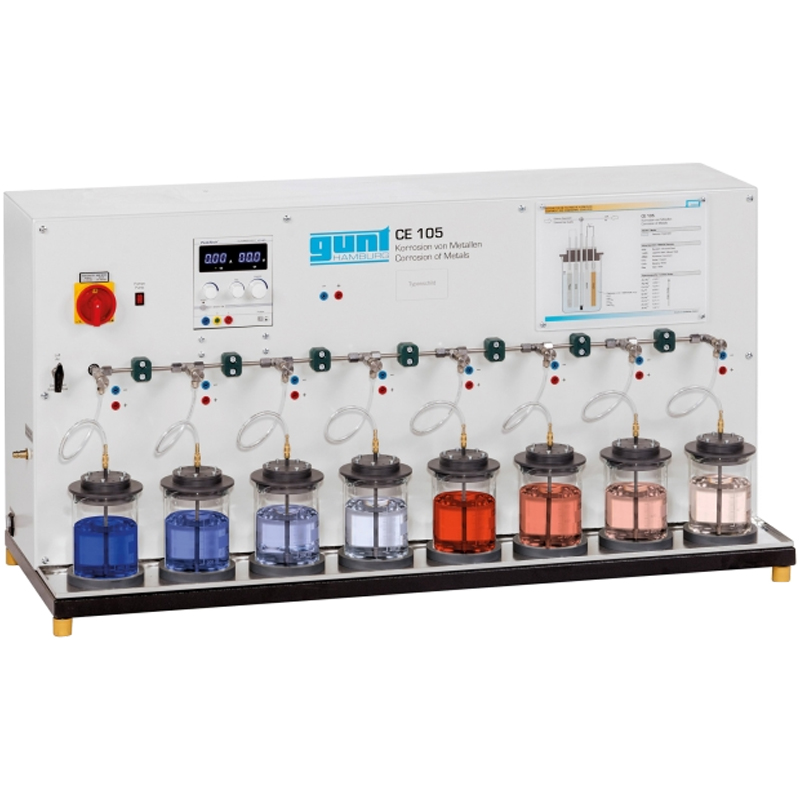DESCRIPTION
Technical Description
Corrosion damage to metallic components causes considerable economic and technical damages. The issue of corrosion and corrosion protection therefore plays an important role in technical training.
The CE 105 allows a variety of factors that influence corrosion processes to be investigated in parallel. Eight glass vessels are available to do this. They allow different materials to be compared under different conditions. The required electrolyte solution is added to the vessels. Up to 6 specimens can be attached to the cover of each vessel and these are immersed in the solution. It is possible to connect specimens to an electrical conductor to investigate local elements and the principle of sacrificial anodes. An adjustable power pack allows an external voltage to be connected. This counters the current flow between precious and base metals in local elements. As result the corrosion rate of the more base metal is reduced.
A diaphragm pump conveys ambient air into the electrolyte solution as required. Flow control valves can be used to individually adjust the gas flow rate for each vessel. It is also possible to feed other gases provided by the laboratory into the electrolyte solution. A pH meter is included to allow the influence of the electrolyte solution on corrosion processes to be investigated and compared.
The well-structured instructional material sets out the fundamentals and provides a step-by-step guide through the experiments.
 Learning Objectives / Experiments
Learning Objectives / Experiments
Corrosion
- corrosion behaviour of different metallic materials (rust / passivation)
- formation of local elements
- influence of pH value of the electrolyte solution
- influence of salt concentration in the
electrolyte solution
- oxygen corrosion
Corrosion protection
- external voltage
- sacrificial anodes
- protective layers
FEATURES
Specification
[1] investigation of corrosion and corrosion protection measures
[2] 8 electrolyte vessels with covers and 6 specimen holders each
[3] adjustable power pack for application of external voltage
[4] air supply via diaphragm pump
[5] reversing valve for air or external gas supply
[6] adjustment of gas flow rate for each vessel using flow control valves
[7] recording of pH value of electrolyte solutions using manual unit
[8] pressure range for external gas supply: 0,2...1,0bar
Technical Data
Electrolyte vessels
- capacity: 1000mL
- material: glass
Power pack
- voltage: 0...30VDC
- current: 0…5A
Diaphragm pump: approx. 260L/h
pH meter
- measuring range: 0…14pH
- resolution: 0,01pH
Specimens
- 6x stainless steel, steel, copper, brass, aluminium each
- 3x glass
- dimensions: 100x15x1mm
Dimensions and Weight
LxWxH: 1280x460x630mm (experimental unit)
Weight: approx. 55kg
LxWxH: 730x480x240mm (storage system)
Weight: approx. 15kg
Required for Operation 230V, 50/60Hz, 1 phase or 120V, 60Hz/CSA, 1 phase
Scope of Delivery
1 corrosion experimental unit
1 pH meter
1 set of specimens
1 set of laboratory cables
1 coupling to connect an external gas supply
1 storage system
1 set of instructional material




